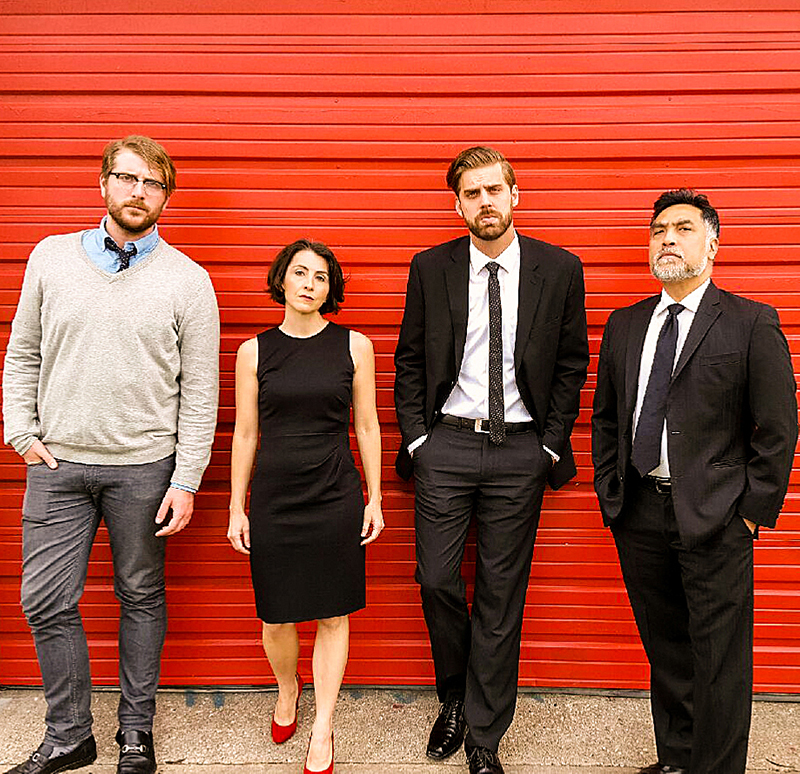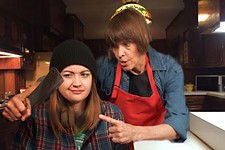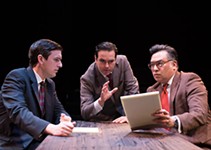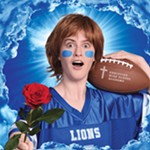Street Corner Arts' Bull
Mike Bartlett's play turns a corporate office into a ring where fighting for your job is a bloodsport
Reviewed by Robert Faires, Fri., April 22, 2016
If nothing else, the title of Mike Bartlett's play conveys a wealth of useful information. "Bull" is one way of describing Thomas, the hapless, anxious figure at the heart of the drama, the one whose utter lack of suitability to the high-gloss corporate world in which he's laboring makes him appear about as graceful there as a you-know-what in a china shop. "Bull" is also a most apt assessment of what streams from the mouths of his team partners, Isobel and Tony, who seem to have made a running game of telling Thomas things that aren't so. And were you to pin a "y" on the end of that titular word, you'd have a fitting term for what Isobel and Tony, and also their boss, Mr. Carter, do to Thomas prior to, during, and after the meeting at which one of the three members of this team will be cut loose. In the moments following the dismissal of that unfortunate employee – can you guess who it might be? – the play even offers a kind of "bull" fight, when the put-upon Thomas is actually coaxed into charging one of his tormentors, only to have his attack deflected and him brought low with a killing blow – which doesn't literally take his life but surely murders what little dignity the character has left at that point.
Here, Bartlett views a competitive, combative human relationship through the lens of animal behavior and through a bloodsport in which beasts are forced to battle, much as he did in his play Cock. That earlier work, seen in Austin in 2014 in an award-winning production by Theatre en Bloc, thrived on the tension among three people fighting for control of a romantic relationship and on the question of which path the central figure would choose: man or woman, gay or straight, past or future. In Bull, however, Thomas gets no choice, at least in terms of his employment. He may want to keep his job, may even believe he'll get a chance to fight for it, but Bartlett makes it clear from the get-go that the decision about who's being fired has been made, mostly by showing Thomas to be the true "odd man out" in this arrangement: criticized for his look and attire, teased, kept out of the loop on key info, easily duped. If someone is going, it's Tom. And Street Corner Arts' staging plays into that mindset, with Anders Nerheim making the character a disheveled, defensive bundle of tics and twitches in a dishwater suit, a nervous schlub who stands in high contrast to Devin Finn's sleek, slick Tony, a smug panther in his black suit, and Suzanne Balling's cunning, controlled Isobel, whose blood-red heels tell you all you need to know about her killer instincts. Even before the play's Darwinian sensibilities are made explicit with references to "culling," we sense Thomas' weakness in this capitalist jungle. We know he won't survive.
And the fact that Thomas' fate is so apparent from the outset is part of what's frustrating about Bull, both the play and this production. Nerheim's embodiment of Thomas is vivid, complex, and personal – he's not necessarily likable yet he's too vulnerable to be dismissed – but because the "bull" in this fight is about as suited to the ring as flower-sniffing Ferdinand, we know that what we're witnessing is a cold-blooded, calculated takedown – the corporate equivalent of those canned hunts where the hunters shoot exotic game enclosed in pens. It's cheerless to watch, even with the humor that Bartlett liberally seasons the script with and its deft handling by the actors and director Benjamin Summers. But perhaps that's the playwright's point. The business of business has become ugly and brutal. The corporate entitlement and aggression that we may have once thought were restricted to Enron and Wall Street have spread to office towers throughout the globe, and the beasts inside them are on the prowl. If they haven't already done so, suggests Bull, they'll soon be stalking you. Prepare to be the predator or the prey.
Bull
Hyde Park Theatre, 511 W. 43rdwww.streetcornerarts.org
Through April 23
Running time: 1 hr., 5 min.













